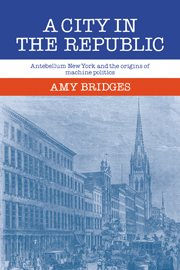Book contents
1 - A CITY IN THE REPUBLIC
Published online by Cambridge University Press: 07 October 2011
Summary
A city in the republic provides an account of politics in New York City between the election of Andrew Jackson and the outbreak of the Civil War. Parts of this story are familiar: the Workingmen's Parties and the “Jacksonian revolution,” the “ferment of reform” of the 1840s, mass immigration and the Know-Nothing movement, the collapse of the second American party system and the birth of the Republican Party. As in cities and states across the union, local politics in New York bore the imprint of national events. At the same time, New York and other antebellum cities witnessed a distinctively urban political reordering that involved changes in party, government, and ideology.
It was in the antebellum years that city politics came to have an independent existence, turning on its own issues rather than on national events. During the 1830s city politics was merely a reflection of national debates between Whigs and Democrats; by the end of the period reformers battled “rings” and “machines.” The local counterpart of the Jacksonian revolution was, on the one hand, the retirement of wealthy men from officeholding and, on the other, the emergence of the career politician in the person of the boss. This change in dramatis personae was associated with changes in the relationship between politics and social life. Political leadership, once based on a more general social deference, came to be based on party organization and mass partisan loyalty.
- Type
- Chapter
- Information
- A City in the RepublicAntebellum New York and the Origins of Machine Politics, pp. 1 - 17Publisher: Cambridge University PressPrint publication year: 1984
- 1
- Cited by



